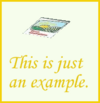Template:Infobox publisher/doc
| This is a documentation subpage for Template:Terminate sentence It may contain usage information, categories and other content that is not part of the original template page. |
This template is designed for articles about publishing companies.
Usage
[edit]Copy a blank version to use. All fields must be lowercase, and all are optional.
| Vertical list | Requirements |
|---|---|
{{Infobox publisher
| image =
| parent =
| status =
| founded =
| founder =
| successor =
| country =
| headquarters =
| distribution =
| keypeople =
| publications =
| topics =
| genre =
| imprints =
| revenue =
| numemployees =
| nasdaq =
| url =
}}
|
None required |
Example
[edit] | |
| Parent company | Awesome Distributions Inc. |
|---|---|
| Status | Active |
| Founded | 1990 |
| Founder | Awesome Q. Publisher |
| Country of origin | Template:Country data United States |
| Headquarters location | New York City |
| Distribution | Worldwide |
| Publication types | Books and magazines |
| Nonfiction topics | Science |
| Fiction genres | Science fiction |
| Imprints | Awescience (science) Awescifi (science fiction) |
| Official website | awepub |
{{Infobox publisher
| image = [[Image:Example.png|100px]]
| parent = Awesome Distributions Inc.
| status = Active
| founded = {{Start date|1990}}
| founder = Awesome Q. Publisher
| country = {{flag|United States}}
| headquarters = New York City
| distribution = Worldwide
| publications = Books and magazines
| topics = Science
| genre = [[Science fiction]]
| imprints = Awescience (science)<br>Awescifi (science fiction)
| url = {{URL|awepub.com}}
}}
Description of fields
[edit]No fields are mandatory but fill in as many fields as possible.
- image: An image of the company logo; make sure it is fair use if uploading. Do not use a thumbnail or include a caption, but include the file name within square brackets as usual and specify the image size in pixels (px) - [[File:Example.png|25px]] produces
 , the file Example.png 25 pixels wide. Make sure the image is more than 25 pixels wide, the example image is 100px.
, the file Example.png 25 pixels wide. Make sure the image is more than 25 pixels wide, the example image is 100px. - parent: If a subsidiary, include the parent company.
- status: Active or defunct; if defunct, give the final year it was in business in brackets.
- founded: Year the company was started, if known. Use the template {{Start date}}, as in {{Start date|YEAR OF FOUNDING}}
- founder: Name of the founder(s); wikilink if possible.
- country: Include the country where the publisher is based. Use the template {{flag}} to produce the flag icon (as an example, {{flag|Canada}} produces
 Canada). Note that the United States and United Kingdom can be linked to using the templates {{USA}} and {{UK}} which produces 20x20px|border|Bandera de Estados Unidos Estados Unidos
Canada). Note that the United States and United Kingdom can be linked to using the templates {{USA}} and {{UK}} which produces 20x20px|border|Bandera de Estados Unidos Estados Unidos  United Kingdom respectively.
United Kingdom respectively. - headquarters: City where the headquarters of the publisher are located (do not use the headquarters of the parent company, that will be specified on the parent company's page).
- distribution: The distribution of the publisher, where its books are sold. Use regional if local distribution only, national if distribution is to an entire country, international if distribution is to multiple countries, and worldwide if it distributes books to anywhere on Earth.
- publications: to indicate the types of publications, such as books, magazines or scientific journals.
- topics:Specify non-fiction topics, such as medicine, science, social sciences, psychology; the level of detail depends on the breadth covered by the publisher.
- genre: If the publisher publishes fiction, specify the genre.
- imprints: If the company has a small number of imprints, list them. Otherwise, list them in the body text with a heading of ==Imprints== and link to it using a within-page link - [[#Imprints|Many]] produces Many and will automatically link to the imprints section heading.
- url: Specify the official website. Use {{URL}}.
Microformat
[edit]The HTML mark up produced by this template includes an hCard microformat, which makes the organisation's details parsable by computers, either acting automatically to catalogue article across Wikipedia, or via a browser tool operated by a reader, to (for example) add the subject to an address book. For more information about the use of microformats on Wikipedia, please see the microformat project.
Sub-templates
[edit]- If the organisation has an "established", "founded", "opened" or similar date, use {{Start date}} (unless the date is before 1583 CE).
- If the organisation has a URL, use {{URL}}.
- If the organisation has a "coordinates" field, use {{Coord}} to include a Geo microformat, which additionally makes the coordinates (latitude & longitude) parsable, so that they can be, say, looked up on a map, or downloaded to a GPS unit.
Please do not remove instances of these sub-templates.
Classes
[edit]hCard uses HTML classes including:
- adr
- agent
- category
- country-name
- extended-address
- fn
- geo
- label
- latitude
- locality
- longitude
- nickname
- note
- org
- region
- street-address
- url
- vcard
Please do not rename or remove these classes; nor collapse nested elements which use them.
See also
[edit]- {{Infobox Book}}
